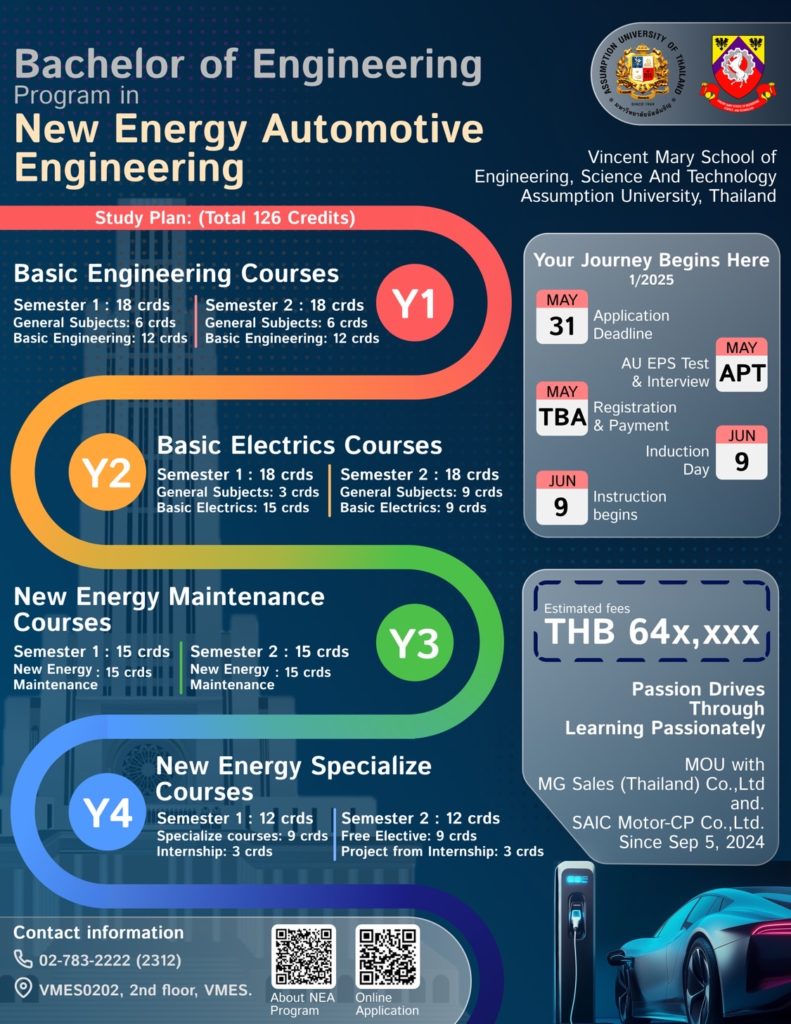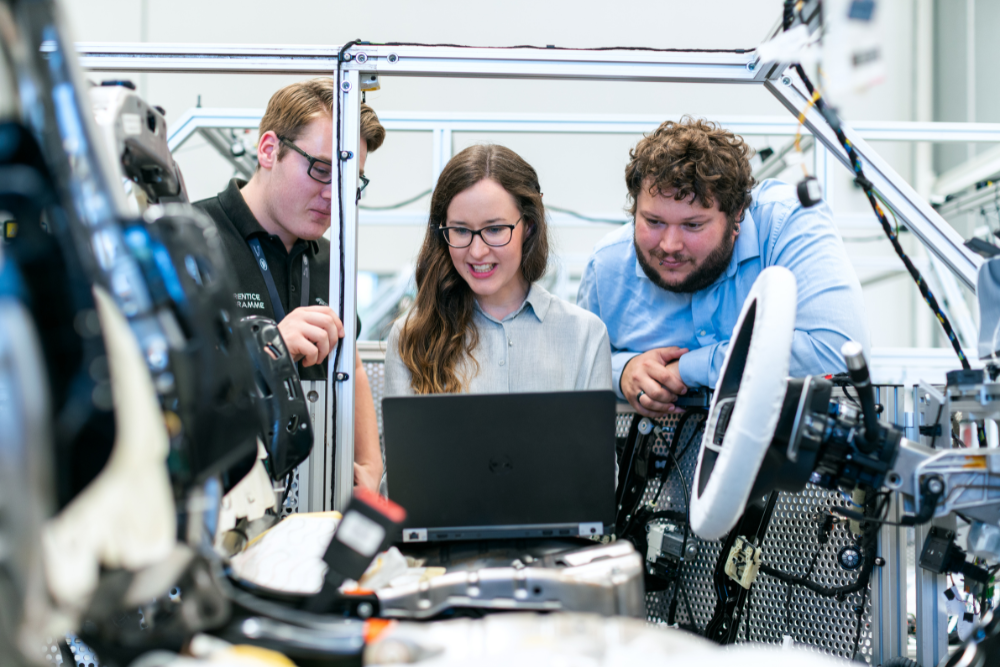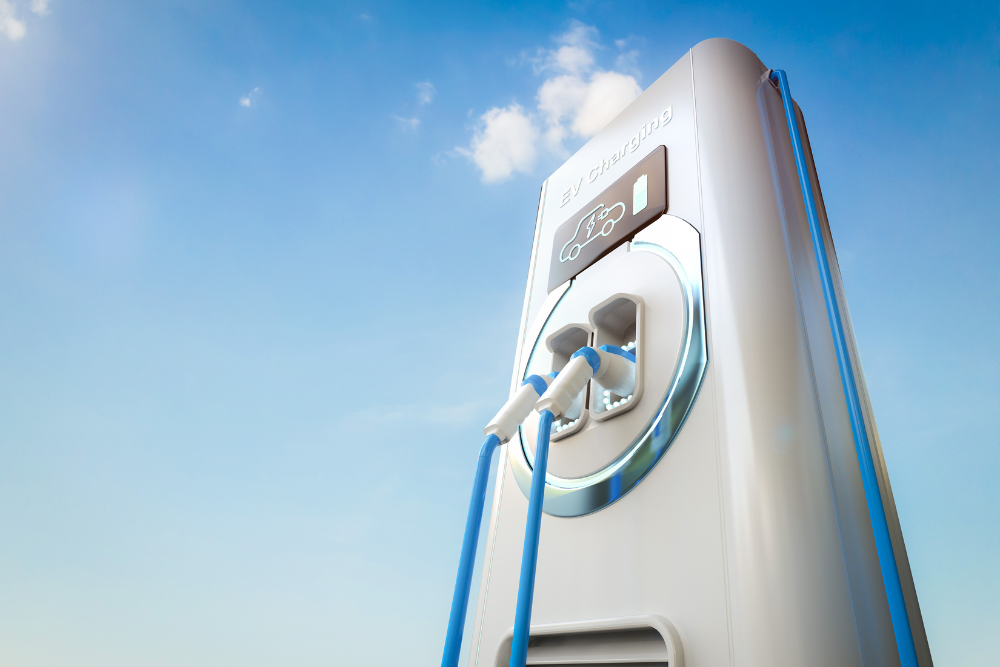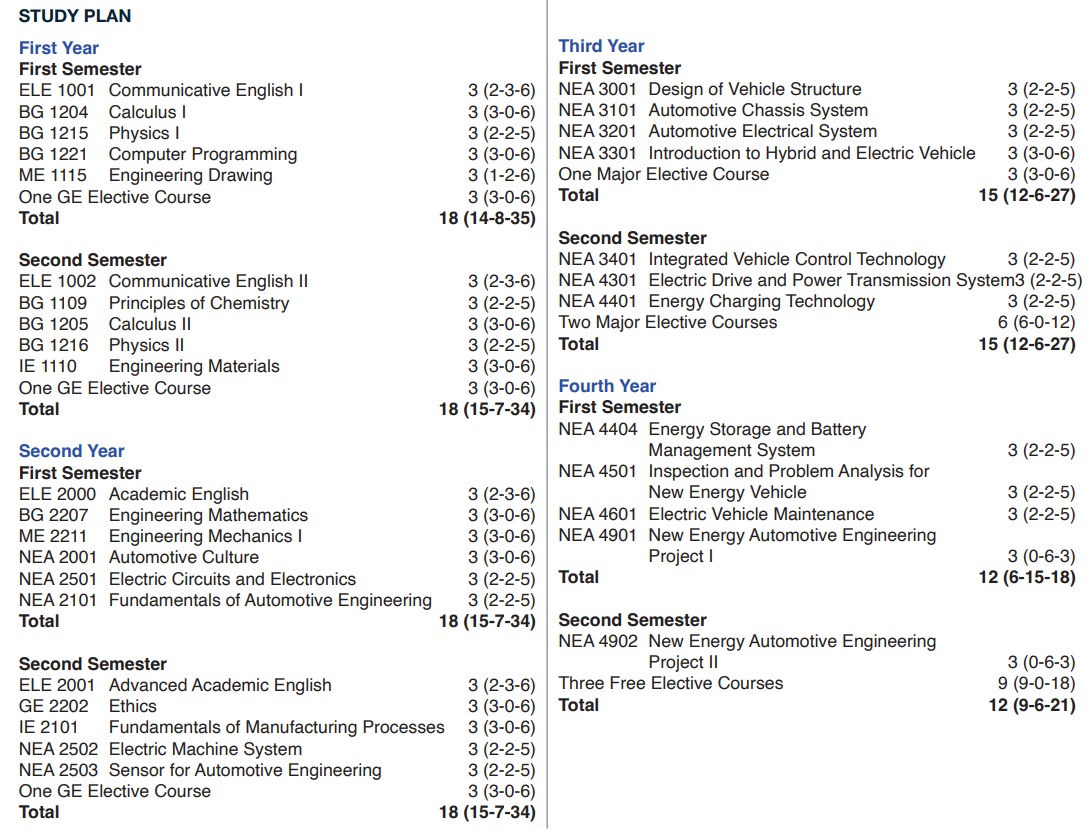New Energy Automotive Engineering (NEA)

New Energy Automotive Engineering (NEA)
New Energy Automotive Engineering is an engineering discipline that allows the combination of several areas of knowledge, such as basic engineering knowledge, basic knowledge in new energy engineering, engineering automotive manufacturing processes, engineering industrial economics and management, quality analysis, and new energy automotive engineering maintenance. In the New Energy Automotive Engineering, students’ knowledge is in a range of specialist occupational modules in automotive inspection, maintenance technology, automotive intelligence, automotive marketing, and automotive service areas.
New Energy Automotive Engineering philosophies and concurrent practices for achieving the physical embodiment of those designs are seen as appropriate to the challenge. The adoption of such philosophies beginning at the conceptual design level requires engineers with a new range of skills and attitudes and with concomitant stimulus to the providers of training and education. This major is one of the new branches of engineering with far-reaching applications in every sector of society.
New Energy Automotive Engineering program provides a broad-based education in the basic principles of engineering, electrical, mechanical, computer, manufacturing, energy, and automotive engineering. In the program, virtual simulation training and professional training rooms are supported by various pedagogical approaches. This is designed to facilitate effective teaching and learning, enabling students to practice the skills needed to deploy in the workplace.
In view of the requirement of engineers with this specialization in Thailand, Assumption University is offering a Bachelor of Engineering Degree program in New Energy Automotive Engineering at the School of Engineering to produce graduates with New Energy Automotive Engineering knowledge, English skills, and ethics.


Professions/Careers after Graduation
- Automotive Engineer
- Energy Engineer
- Industrial Engineer
- Control Engineer
- Instrumentation Engineer
- Manufacturing Engineer
- Design Engineer
- Operation Engineer
- Maintenance Engineer
- Maintenance Engineer
- Application Engineer
- Sales and Service Engineer
- Engineering Entrepreneur


Graduation Requirements
Assumption University confers the degree of Bachelor of Engineering in New Energy Automotive Engineering upon students who meet all of the following requirements:
- Have completed the total number of credits of the curriculum
- Have obtained a cumulative grade point average of at least 2.00
- Have participated in 16 sessions of the Professional Ethics Seminar for 4 years logical number of sessions in case students completed their study before 4 years example, 14 sessions for 3.5 years of study.
- Have obtained library and financial clearance from the University
- Have demonstrated good behavior and discipline
- Have to meet the minimum English Proficiency requirement specified in one of the following criteria
| Test Instruments | Required Passing Scores |
|---|---|
| AU English Proficiency Assessment OR | 70%* |
| TOEFL (iBT) OR | 90 |
| TOEFL (P) OR | 575 |
| IELTS | 6.5 |
(Other requirements as needed)


Objectives of the Curriculum
To produce graduates who have the characteristics, knowledge, and skills as follows:
1. Knowledge
- Possess basic engineering knowledge
- Possess specific knowledge for new energy automotive engineers
- Possess practical knowledge in new energy automotive engineering
- Acquire reading, writing, listening, and speaking skills in English
- Understand a wide variety of knowledge areas and contemporary issues through studies
2. Skills
- Have systematic problem-solving skills
- Develop skills to design, build, and operate new energy automotive systems such as new energy technology, energy storage and management, and electric vehicle application and maintenance
- Acquire computer programming skills to operate, design, make, and operate computer-controlled systems in the area of automotive engineering
- Develop 21st-century skills
- Comprehend and effectively respond to various forms of English/Thai communications
3. Ethics
- Demonstrate responsibility, discipline, and punctuality
- Have a high regard for the safety of others
- Have a service-minded attitude
4. Character
- Become a good team player and cooperate with colleagues
- Excel in both theoretical and practical aspects in New Energy Automotive Engineering
- Demonstrate systematic approaches for critical decision thinking


Program Structure and Study Plan
Students must earn a total of 126 credits.
| A. General Education Courses | 24 Credits |
|---|---|
| Required Courses | 15 Credits |
| Elective Courses | 9 Credits |
| B. Specialized Courses | 97 Credits |
|---|---|
| Basic Engineering Courses | 24 Credits |
| Core Courses | 24 Credits |
| Major Required Courses | 36 Credits |
| Major Elective Courses | 9 Credits |
| C. Free Elective Courses | 9 Credits |
|---|
Study Plan

| First Year – First Semester | ||
|---|---|---|
| Course Code | Course Title | Credits |
| ELE 1001 | Communicative English I | 3 (2-3-6) |
| BG 1204 | Calculus I | 3 (3-0-6) |
| BG 1215 | Physics I | 3 (2-3-5) |
| BG 1221 | Computer Programming | 3 (3-0-6) |
| ME 1115 | Engineering Drawing | 3 (1-2-6) |
| One GE Elective Course | 3 (3-0-6) | |
| Total | 18 (14-8-35) | |
| First Year – Second Semester | ||
|---|---|---|
| Course Code | Course Title | Credits |
| ELE 1002 | Communicative English II | 3 (2-3-6) |
| BG 1109 | Principle of Chemistry | 3 (2-2-5) |
| BG 1205 | Calculus II | 3 (3-0-6) |
| BG 1216 | Physics II | 3 (2-2-5) |
| IE 1110 | Engineering Materials | 3 (3-0-6) |
| One GE Elective Course | 3 (3-0-6) | |
| Total | 18 (15-7-34) | |
| Second Year – First Semester | ||
|---|---|---|
| Course Code | Course Title | Credits |
| ELE 2000 | Academic English | 3 (2-3-6) |
| BG 2207 | Engineering Mathematics | 3 (3-0-6) |
| ME 2211 | Engineering Mechanics I | 3 (3-0-6) |
| NEA 2001 | Automotive Culture | 3 (3-0-6) |
| NEA 2501 | Electric Circuits and Electronics | 3 (2-2-5) |
| NEA 2101 | Fundamentals of Automotive Engineering | 3 (2-2-5) |
| Total | 18 (15-7-34) | |
| Second Year – Second Semester | ||
|---|---|---|
| Course Code | Course Title | Credits |
| ELE 2001 | Advanced Academic English | 3 (2-3-6) |
| GE 2202 | Ethics | 3 (3-0-6) |
| IE 2101 | Fundamental of Manufacturing Processes | 3 (3-0-6) |
| NEA 2502 | Electric Machine System | 3 (2-2-5) |
| NEA 2503 | Sensor for Automotive Engineering | 3 (2-2-5) |
| One GE Elective Course | 3 (3-0-6) | |
| Total | 18 (15-7-34) | |
| Third Year – First Semester | ||
|---|---|---|
| Course Code | Course Title | Credits |
| NEA 3001 | Design of Vehicle Structure | 3 (2-2-5) |
| NEA 3101 | Automotive Chassis System | 3 (2-2-5) |
| NEA 3201 | Automotive Electrical System | 3 (2-2-5) |
| NEA 3301 | Introduction to Hybrid and Electric Vehicle | 3 (3-0-6) |
| One Major Elective Course | 3 (3-0-6) | |
| Total | 15 (12-6-27) | |
| Third Year – Second Semester | ||
|---|---|---|
| Course Code | Course Title | Credits |
| NEA 3401 | Integrated Vehicle Control Technology | 3 (2-2-5) |
| NEA 4301 | Electric Drive and Power Transmission System | 3 (2-2-5) |
| NEA 4401 | Energy Charging Technology | 3 (2-2-5) |
| Two Major Elective Courses | 6 (6-0-12) | |
| Total | 15 (12-6-27) | |
| Fourth Year – First Semester | ||
|---|---|---|
| Course Code | Course Title | Credits |
| NEA 4404 | Energy Storage and Battery Management System | 3 (2-3-5) |
| NEA 4501 | Inspection and Problem Analysis for New Energy Vehicle | 3 (2-3-5) |
| NEA 4601 | Electric Vehicle Maintenance | 3 (2-3-5) |
| NEA 4901 | New Energy Automotive Engineering Project I | 3 (0-6-3) |
| Total | 12 (6-15-18) | |
| Fourth Year – Second Semester | ||
|---|---|---|
| Course Code | Course Title | Credits |
| NEA 4902 | New Energy Automotive Engineering Project II | 3 (0-6-3) |
| Three Free Elective Courses | 9 (9-0-18) | |
| Total | 12 (9-6-21) | |
Student Admission Requirements
- Applicants with any of the following qualifications are eligible to apply :
- High School or grade 12 (M.6 Certificate) graduation diploma or its equivalent as issued by the Ministry of Education
- I.G.C.S.E./G.C.S.E./ G.C.E. ‘O’ level certificates with results not lower than C in at least 5 subjects
- GED Transcript and Diploma
- IB certificate with scores not lower than 4 in at least 5 subjects
- ‘A’ level certificate with grades not lower than “E” in at least 3 subjects;
- Record of Learning with scores not lower than 7 credits in at least 5 subjects for the applicants who have graduated from New Zealand
- Certificate of Education and statement of results, which are issued by the Australian Qualifications Framework for applicants who have graduated from Australia
- Other equivalent certificates or diplomas, as authorized by the Ministry of Education. **Remark: ** Other equivalent high school certificates or diplomas must be translated to English and issued or certified by their own government’s Ministry of Education, Foreign Ministry, or Embassy, or issued in English by their graduated school, confirming that graduates of these programs are eligible to apply to regular full-time programs worldwide. Transfer credits from other institutions to the program are to be considered for eligibility and approved by the internal committee.
- Applicants must be free from infectious diseases or other handicaps that can hinder their study. Applicants must be physically and mentally healthy
- Applicants must be able to bear all expenses related to their study
- Applicants must have good manners and testify to the university that they will be attentive, make the fullest use of their capabilities in their studies, and strictly conform to the University’s rules and regulations.



